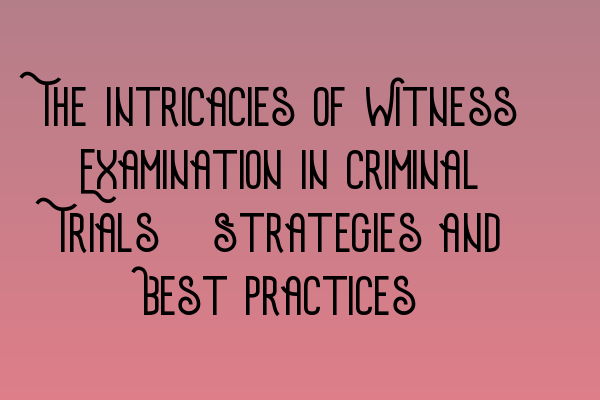The Intricacies of Witness Examination in Criminal Trials: Strategies and Best Practices
Effective witness examination is a critical aspect of criminal trials. It plays a crucial role in unraveling the truth, uncovering crucial evidence, and persuading the jury. As a solicitor, mastering the art of witness examination is essential to present a convincing case and secure a favorable outcome for your client. In this article, we will explore the intricacies of witness examination, highlighting strategies and best practices to enhance your skills in the courtroom.
Understanding the Purpose of Witness Examination
Before delving into witness examination techniques, it is crucial to grasp the purpose of this stage in a criminal trial. Witness examination serves multiple functions:
- Evidence Presentation: It allows you to present evidence to support your client’s case. By questioning witnesses effectively, you can elicit key information and facts that strengthen your argument and refute the opposing side’s claims.
- Credibility Evaluation: Witness examination allows you to assess the credibility of witnesses. Through skillful questioning, you can expose inconsistencies, biases, or motives that may undermine their trustworthiness.
- Persuasion: Effective witness examination helps you persuasively communicate your client’s version of events. It enables you to shape the narrative, highlighting favorable aspects and discrediting contradictory statements.
Preparing for Witness Examination
Preparation is the key to successful witness examination. Prior to the trial, carefully review all relevant documents, statements, and evidence. Familiarize yourself with the facts of the case and identify the crucial points to emphasize during examination. Develop a clear strategy and structure for your questioning, keeping in mind the ultimate goal of proving your client’s innocence or casting doubt on the prosecution’s case.
Additionally, anticipate potential challenges or objections that the opposing counsel may raise. Prepare alternative lines of questioning and possible rebuttals to effectively address these challenges and maintain control during the examination.
Strategies for Effective Witness Examination
Now let’s explore some strategies and best practices to help you conduct a compelling witness examination in criminal trials:
- Establishing Rapport: Begin by establishing a rapport with the witness to create a comfortable and conducive environment for questioning. This can be achieved through respectful and empathetic communication, acknowledging the witness’s role in seeking justice.
- Open-Ended Questions: Start with open-ended questions to encourage the witness to provide detailed responses. This allows for a more comprehensive understanding of the events and provides opportunities for the witness to provide important facts or information.
- Sequential Questioning: Structure your questioning sequentially, guiding the witness through a logical progression of events. This helps establish a clear timeline and reinforces the credibility of the witness’s testimony.
- Active Listening: Actively listen to the witness’s responses, paying attention to both verbal and non-verbal cues. This allows you to identify inconsistencies or areas that require further exploration.
- Leading Questions: Use leading questions strategically to highlight key points and elicit desired responses. However, be cautious not to overuse leading questions, as it may undermine the witness’s credibility if it appears you are scripting their testimony.
- Controlling the Narrative: Take control of the narrative by framing questions in a way that reinforces your client’s version of events. Use the witness’s own words and prior statements to support your arguments and challenge inconsistencies in the opposing side’s case.
- Objectivity and Respect: Maintain a professional and respectful demeanor throughout the examination. Avoid engaging in confrontational or hostile questioning, as it may alienate the witness and negatively impact their perception by the jury.
Utilizing Technology and Expert Witnesses
In today’s digital age, leveraging technology can significantly enhance the effectiveness of witness examination. Presenting visual aids, such as photographs, videos, or diagrams, can help elucidate complex concepts and strengthen your arguments.
Furthermore, consider utilizing expert witnesses to provide specialized knowledge or opinion on technical matters. Expert witnesses can bolster your case by offering insights, interpretations, or explanations that support your client’s position.
Conclusion
Mastering the intricacies of witness examination is a continuous learning process. By understanding the purpose, preparing meticulously, and employing effective strategies, you can enhance your skills as a solicitor in criminal trials. Remember, effective witness examination is not only about presenting evidence but also about building trust, shaping narratives, and persuading the jury in favor of your client.
For more information on other aspects of criminal law and practice, check out our related articles:
